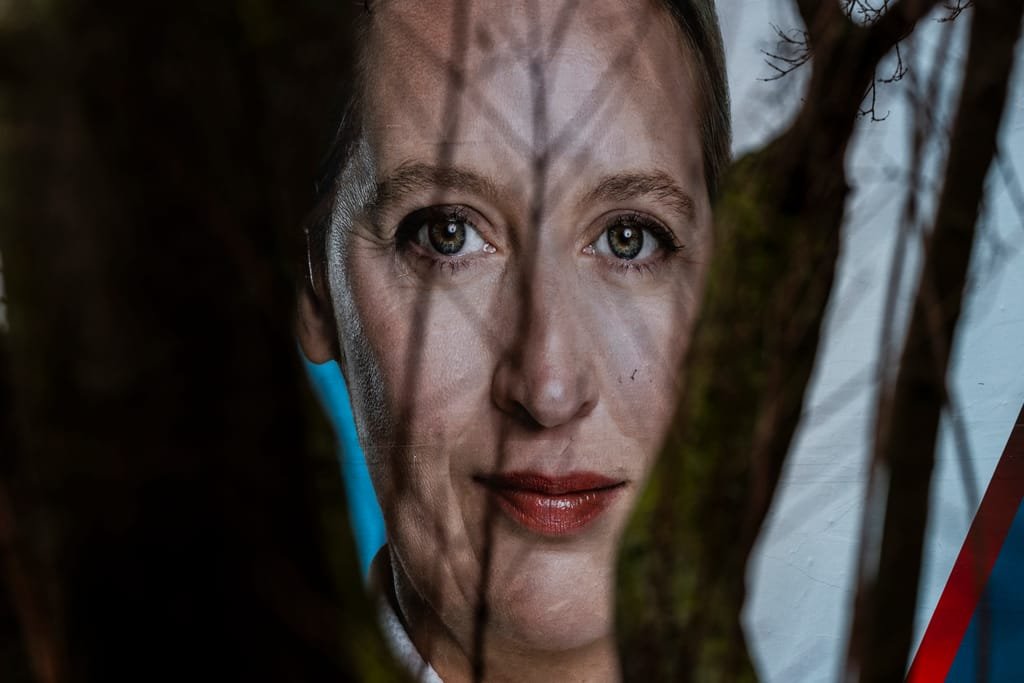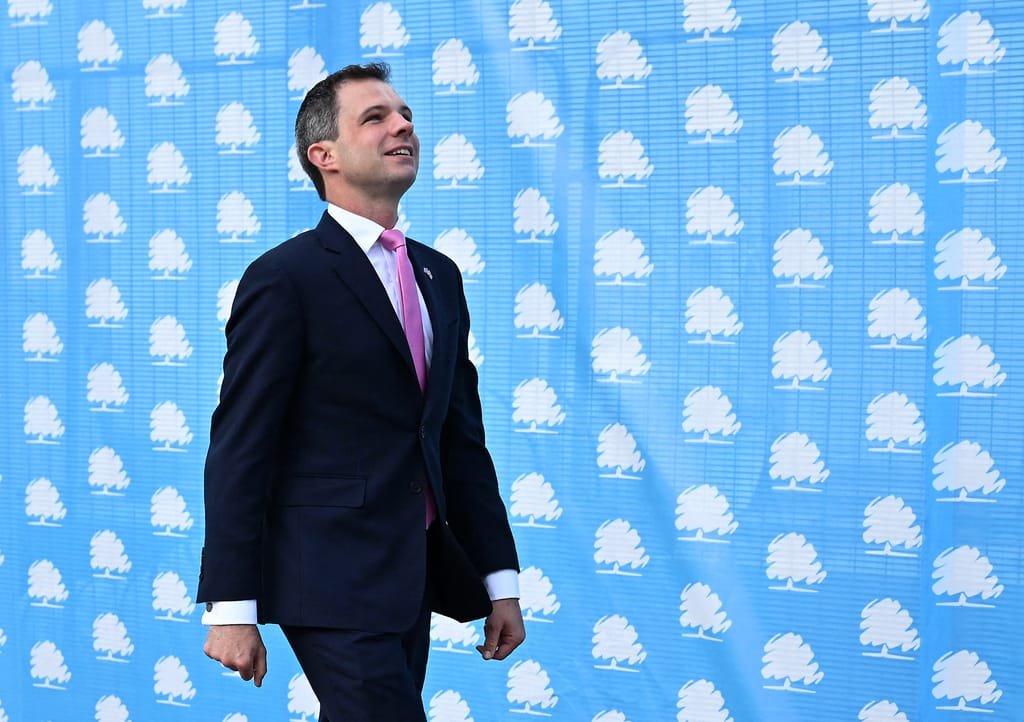One of the world’s most climate-ambitious governments is about to fall, replaced by a likely chancellor who says green policy went too far.

Chancellor Olaf Scholz promised to build back better. Friedrich Merz is promising to rebuild Germany any damn way he can.
Whatever happens in Germany’s election on Sunday, one thing is inevitable: One of the world’s most climate-ambitious governments will fall.
In its place will likely rise a successor less focused on the fate of the world than on the fate of the Ruhr and other industrial heartlands. Merz has led his center-right Christian Democratic Union to first place in the polls and is poised to become Germany’s next chancellor.
And Merz’s message is that green policy has gone too far — a response to both Germany’s industrial woes and the rise of the second-place, climate-denying far-right Alternative for Germany, or AfD. Merz even told POLITICO he will decouple the economy and climate ministry, which the Greens currently helm.
That echoes a shift — reverberating across Berlin, Brussels and beyond — away from seeing climate change policy as both a moral obligation and elixir for economic decline.
“There’s less space for moral arguments in German politics in the current economic circumstances,” conceded Sven Giegold, deputy chair of the Green Party and former state secretary in the economy and climate ministry.
Economy is king
Moving forward, efforts to tackle global warming will be “subordinate” to economic growth, Merz said. On the campaign trail, the conservative leader has repeatedly tied Germany’s economic woes to climate policy, especially focusing on the bureaucratic burden.
“That’s politicking,” said Giegold. “Everybody who is reasonable knows that the crisis of the German economy is not because of the climate policies, but because of our sudden change in energy prices.”
The reason for that: “A change on the supply side because of Russia.” In other words, Moscow’s war in Ukraine and the resulting energy cutoffs to Europe.
Those costs, Giegold said, exacerbated deep structural challenges, such as an aging population and declining exports to China and Russia. Other commentators have pointed to the political paralysis of the current coalition as a further detrimental factor.
The CDU can’t drive through its contrasting view alone, however. Polling at 30 percent, the conservative party is expected to form a coalition to govern. A union with Scholz’s Social Democrats or the Greens — or both — are seen as the most likely options, given cooperation with the AfD is a political taboo in Germany.
“I do not expect — necessarily — such a big turnaround [on climate policy]. But it depends very much on whether the Greens will continue to be in government,” Giegold told POLITICO.

Such a coalition would only be possible if Merz continued the current government’s climate policy, he said.
“It’s very simple. If the Greens are needed in government … there will be, of course, fundamentally, continuity on climate policies,” Giegold said. “You cannot have the Greens in government and be laxiste on climate.”
The global backdrop
Berlin’s shifting priorities are feeding a sense of drift globally. Faced with cost-of-living pressures, citizens of industrialized economies have elected a string of governments less focused on climate change.
In some cases, these governments are downright hostile. United States President Donald Trump has torn up the Paris Agreement to limit global warming and is trying to crush the clean economy. New Zealand, until recently a poster child for green soft power, is under new management and the coalition is reversing climate targets. Canada and Australia may soon follow. Meanwhile, in Brussels and many EU capitals, green policy is now seen as useful where it can drive industrial competitiveness and jettisoned when it doesn’t.
“The global momentum for climate action shows signs of withering as nations struggle to balance economic self-interest and climate cooperation,” said Alice Hill, a senior fellow at the Washington-based Council on Foreign Relations.
The current German government — which pulls together Scholz’s Social Democrats, the Greens and the business-friendly Free Democrats — assumed power in 2021 and fully embraced the Covid-era build-back-better doctrine.
Just a month into his chancellorship, Scholz told the World Economic Forum that the 2020s must be marked by “not just more progress but better progress.”
Green central planning was fundamental to that vision. The government pulled forward plans to phase out coal power eight years to 2030, mandated an end to gas boilers in homes and set up a €170 billion fund for clean energy projects like wind farms and power grid upgrades. The foreign ministry employed the former global head of Greenpeace as its top climate envoy.
But the energy crisis curdled that optimism. The German economy has stopped growing and companies report exceptional levels of pessimism. Then, the country’s top court blocked the government’s attempt to divert €60 billion in pandemic-era loans to its climate campaign, leaving the government’s green agenda adrift.
How far will it go?
Should Merz, a former corporate lobbyist, become chancellor, his first priority will be to reinvigorate German industry. While few observers expect a wholesale green reversal, this will almost certainly involve freeing companies from some requirements.
“It’s very much market-driven,” said Marc Weissgerber, the executive director of the Berlin branch of E3G, a green think tank. “They’re very much anti-regulation slash anti-bureaucracy.”
That won’t necessarily be bad news for the climate, said Linda Kalcher, executive director of Strategic Perspectives, another climate-friendly think tank. “A lot of the conversations will be about what the German industrial strategy looks like, where they want to be competitive and some of the sectors will inevitably be the sectors that help decarbonize.”

Some industrialists — including the steel and home heating sectors — have urged all political parties to stick to the current government’s policies.
“Obviously it’s not that all companies now want to decarbonize,” said Kalcher. “But the general direction of travel is clear.”
Brussels will be carefully watching how the next German government approaches climate change. European Commission President Ursula von der Leyen is a CDU member and is under pressure from her party to curb the European Union’s Green Deal agenda.
In January, Merz convinced center-right leaders from across the bloc, including von der Leyen, to sign up to a host of green rollbacks. In power, he would join Poland’s Donald Tusk and France’s Emmanuel Macron as leaders of major EU economies worried about the effect of green policy on industrial output. In particular, the German CDU has campaigned hard against the EU’s 2035 ban on combustion engine car sales.
Tusk also wants to delay an upcoming expansion of the EU’s carbon pricing scheme — essentially a cap-and-trade system — to cover all road transport and home heating emissions. But Peter Liese, the CDU’s top lawmaker on climate issues in the European Parliament, has been adamant his political family will stand by that policy.
Once campaign trail rhetoric shifts to coalition-building horse-trading, the Greens are preparing to go all-in on ensuring climate policy is still considered an economic growth driver.
“Of course,” said Giegold, the former Greens state secretary, “we will have to make compromises in all sorts of fields and Germany will change its policies with a CDU-led government. That’s clear. But not on climate.”
Zia Weise contributed reporting from Brussels.




